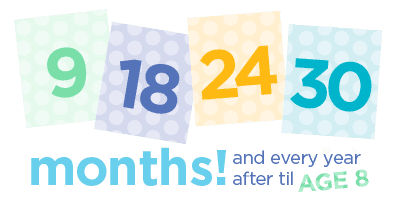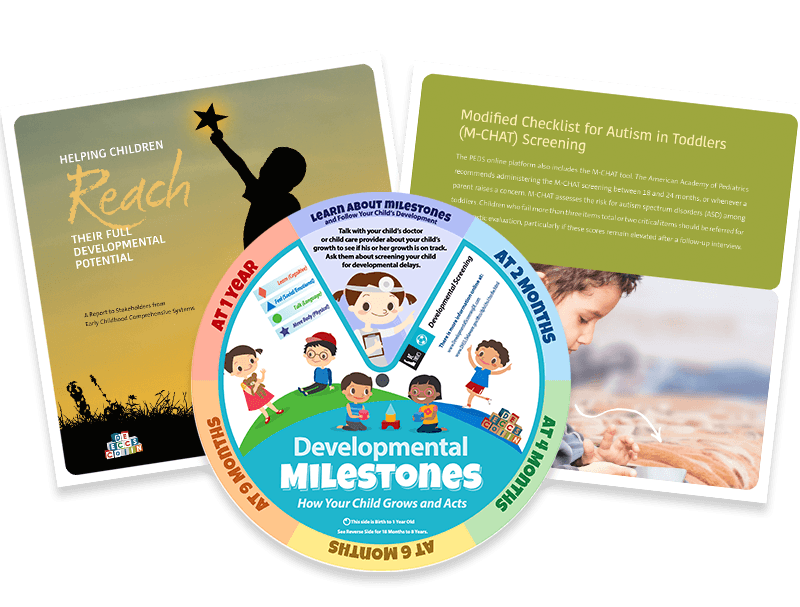Developmental Screening
Know your child’s milestones.
Developmental milestones are clues that your child is growing as expected. The way kids listen, talk, act, and learn at specific ages are big milestones. These are key to a healthy start in life.

What is developmental screening?
Developmental screening allows a parent to complete a questionnaire about their child’s growth and emotional well-being. The questionnaire will provide insights as to whether the child’s growth and emotional health are on track. The American Academy of Pediatrics recommends a system of developmental monitoring and screening in order to identify conditions or delays impacting children’s development over the long and short term. The Academy recommends the promotion of early detection and intervention for developmental disorders to improve the well-being of children and families.
Developmental delays and disabilities such as autism, behavioral disorders, speech, and language challenges are frequently missed until the child reaches school age — which is too late. Research shows the earlier the detection, the better the chances for a child with developmental delays to improve. Developmental screening is therefore critical to ensuring a child’s school readiness and social emotional health.
Know your child’s milestones
Developmental milestones are clues that your child is growing as expected. The way kids listen, talk, move, act, and learn at specific ages are big milestones. These are key to a healthy start in life.
Milestones by age
There are ways that children speak, act, and learn by certain ages. For example, most babies make a lot of sounds and say “mama” by nine months. A doctor or childcare provider can check to make sure a child is on track. When they are not, it’s time to get help.
CDC Milestone Checklist
Delaware milestones
Over 170,000 evidence-based screens (ASQ and PEDS) were completed between January 2014 and December 2020.
Source: MCH/ECCS: 2020 PEDS and ASQ Online Data
Early intervention
The screening result is just a snapshot of a child’s development. It is not an assessment. After the screening, there are three possible result levels: High Risk, Medium Risk, or No Risk. High Risk means there’s a greater chance of delays and the need to refer to an early intervention program for further assessment. Medium Risk means the child could show a level of developmental delay in one or more areas of development. If a child needs an evaluation, depending on their age, one of two organizations will reach out.
Staff from Birth to Three

Delaware milestones
About 17,000 unduplicated kids, or 20% of children in Delaware from birth to 8 years old, have been screened.
Source: MCH/ECCS: 2020 PEDS and ASQ Online Data
Why screen kids?
Developmental delays and disabilities like autism, behavioral disorders, speech, and language challenges can be missed until the child reaches school age. That’s too late. Research shows the earlier developmental delays are detected, the higher the chance for improvement. That’s how developmental screens help.
These are the screeners the state prefers:
Ages and Stages (ASQ)
- These are FREE screenings the Delaware Department of Education (DDOE) offers to all families with children 0-5. They are also used by Home Visiting programs, childcare, and education settings.
- For ages birth to 34 months (birth to 3 years), access the Birth to Three Early Intervention Program’s screener
- For ages 34–60 months (3–5 years), access your child’s school district program’s resources.
- Parents’ Evaluation of Developmental Status (PEDS) online screen
- Used in pediatric and family medicine practices.
- Modified Checklist for Autism in Toddlers (M-CHAT) screen
- Used by doctors’ offices only.
- Parent completes the questionnaire and a follow-up interview is conducted for more details.
In Delaware, health care providers use the Parents’ Evaluation of Developmental Status (PEDS) online tool. Home Visiting programs, childcare, and education settings use the Ages and Stages Questionnaire (ASQ).
According to the American Academy of Pediatrics, Bright Futures recommends Developmental Screenings at 9, 18, 24, and 30 months, and every year after. The new Delaware legislation requires licensed childcare centers to do annual developmental and social emotional screening. If you’re worried about a child’s developmental progress, talk to friends, family, or reach out to your child’s doctor for more information and help.
According to House Bill 202
Need help? Call 2-1-1 for the Help Me Grow program. It can help you find screening services. Or you can come to one of our Books Balls & Blocks events where screenings are available.

Talking to Those Around You
Talking to your health care provider
Each time you take your child to a well visit, you can get them a developmental screening. Even if you don’t have any concerns, you can ask to have your child screened. If you do have concerns about your child’s development, share them with the doctor. Visit the CDC for more information
Family and Caregiver Guide for Developmental Concerns
Here are tips on how to share concerns about your child’s development:
- Be Prepared. Make notes about what milestones you think your child is missing. Be specific and give examples. This can help your doctor understand your concerns.
- Be Persistent. Your child’s healthy development is essential. Your concerns can be emotional. It is crucial to be clear and concise. Do not accept unclear answers from the doctor like “don’t worry” or “let’s wait and see.” If you still do not get clear answers, ask for a referral to see a pediatrician specializing in development or behavior.
- Ask Questions. Ask for clarity if you don’t fully understand the terms your doctor uses. Make sure you ask for results after a screening or tests and what those results mean. If you are unsure, also ask about the next steps.
- Follow Up. Ask for screenings at 9, 18, 24, and 30 months, and every year after. Suppose a screening suggests your child is at risk for developmental delays. In that case, you can get a follow-up from an early intervention program. Your doctor can refer you to an early intervention program, or you can call 2-1-1 for the Help Me Grow call center.

Delaware milestones
36 practices + 78 physicians trained to implement PEDS online across the state.
Source: MCH/ECCS: 2020 PEDS and ASQ Online Data

Delaware milestones
Most Delaware kids have met the developmental milestones by the time they go to kindergarten.
Source: MCH/ECCS: 2020 PEDS and ASQ Online Data
Additional Resources
Below are resources and outside services that can help.
Developmental Screening QR Code Tabletop Handout
Information for parents and guardians about developmental screening for children from birth to 36 months of age. Two-sided — English and Spanish — with a QR code to the Ages & Stages Questionnaire.
Delaware Division of Behavioral Health
The Division of Prevention and Behavioral Health Services, also known as DPBHS, provides an array of prevention, early intervention, and behavioral health treatment services statewide.
Division of Social Services for SNAP Benefits
Supplemental Nutrition Assistance Program (SNAP) is a food supplemental program that enables low-income families to buy a variety of food that is the basis for better nutrition.
Special Supplemental Nutrition Program for Women, Infants, and Children (WIC)
WIC helps pregnant women, new mothers, and young children eat well, learn about nutrition (WIC Smart), and stay healthy.
Delaware Child Psychiatry Access Program (DCPAP)
Delaware Child Psychiatry Access Program (DCPAP) provides pediatric primary care professionals with free child psychiatry consultation and behavioral health training.



